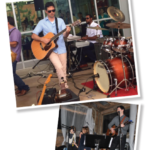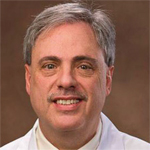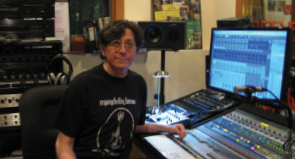
The Beatles. Jimi Hendrix. Country Joe & the Fish. Gandalf Universal Library. Gandalf who? That was the name of a 1960’s high school band formed by Jerry W. Goldberg, MD, who has worked for the past 30 years as a rheumatologist at the Marshfield Clinic in Marshfield, Wis. Back then, it seemed like everyone was either in a rock band or wanted to be in one.
Much has changed since then, but not everything: Dr. Goldberg still plays the guitar. He’s still in a band. Now at age 66, he still performs. His band, called The Pointless Brothers, mainly performs at charitable events throughout the year. Although none of their original songs have hit Billboard magazine’s chart, Dr. Goldberg doesn’t seem to mind. He enjoys practicing each week with his band, teaching other physicians to play guitar and recording songs performed by local musicians in his own recording studio.
Donkeys to Pointless Brothers
The only constant throughout Dr. Goldberg’s life has been music. After graduating from University of California, Berkeley in 1970, he worked as a Head Start teacher for three years, and then he decided to enroll in medical school. His grueling schedule meant there wasn’t any time left to practice until his residency at Baylor University in Houston.
“The nice thing about a musical instrument is you don’t need anything except a few moments [to practice] or small periods of time,” Dr. Goldberg says. “A guitar is always willing to be [played].”
Some of his bands have had seriously weird names. While at Baylor, one was called Donkeys from Mars. “It just came out of the blue,” he says. During the early 1980s, he was also a guitarist for The Apologetics. But the band had nothing to apologize for since it played steady gigs, mainly at parties and weddings throughout Houston.
In 1984, Dr. Goldberg moved to Marshfield. Through word of mouth, he formed a new band called The Pointless Brothers.
Although the band has had multiple incarnations and different band members throughout its life, the name stuck and has been used for almost 30 years, he says, adding that band members now include a lab manager, businessman and techie. Sometimes, a medical assistant joins the band as lead singer.
Dr. Goldberg is naturally gifted, having only received one guitar lesson and one voice lesson in his entire life. He considers himself a competent, semi-amateur guitarist.
“I’ve always played by ear,” Dr. Goldberg says, adding that he also plays other instruments, including the banjo, bass guitar, piano and accordion.
His band typically performs songs by Steely Dan, The Cars, Linda Ronstadt, Bonnie Raitt, Etta James and Motown artists. Only once in a while will it play original songs, he says, because people typically prefer to dance to familiar or popular tunes.
And music is all they do. Forget theatrics like dancers, pyrotechnics or smashing guitars on stage. Local fans simply want to hear good music, as evidenced by their t-shirts, which are printed with the band’s name. The town seems to love them. Even reviews among local music critics are “highly favorable,” says Dr. Goldberg.
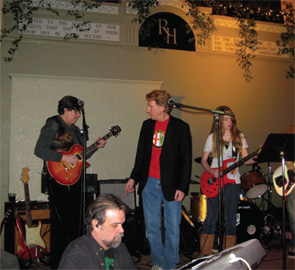
Downstairs Magic
In between practicing medicine and playing the guitar, Dr. Goldberg found time to build a recording studio in his basement. He refers to it as a “beautiful live room” that contains a set of Yamaha drums, multiple keyboards, a Hammond B3 organ, a Wurlitzer piano, 15 amplifiers, 40 electric and acoustic guitars, at least 10 bass guitars and all kinds of rhythm instruments. His collection also includes guitar pedals that alter sounds by creating an echo or reverb, for example.
“My adage is that happiness is always one pedal away,” Dr. Goldberg jokingly says. “What I’m looking for is a pedal that gives you talent. I haven’t found one yet.”
No one, however, is laughing at his newfound ability as an audio engineer. Many local musicians and students from the nearby high school and college record their songs in his studio for free. So far, he’s recorded two albums and is in the process of recording a third. He’s currently working with a songwriter whose father was a member of the Grass Roots, a popular rock band during the 1960s and 1970s.
Ironically, he has yet to record an album of original songs by his own band. He explains that life often gets in the way. Up to now, only four of the band’s 10 original songs have been recorded.
“I’ve been writing songs for about 35 years,” Dr. Goldberg says, adding that he’s especially good at writing song titles like, “I Was the Dope She Was Doing.” However, he says, “I haven’t gotten so far as to write the lyrics.”
One idea he’s considering is to record a collection of songs by local musicians and then sell the CD for $5 at local bookstores. He believes it may be an effective way to introduce and promote local talent to the community.
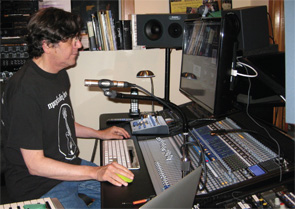
Over the years, his band has performed at multiple events, including the Marshfield Clinic’s Christmas party, and an annual masquerade party and outdoor street party, both fundraisers for the local arts center.
Looking back, he says there are two main differences between his early and current performances. Since he always schleps his own equipment to each gig, he now focuses on the weight of his equipment rather than its quality. The other is … well … bedtime.
“In the old days, we started playing about 9 p.m. and quit at 2 in the morning,” he says. “Now we want to start playing about 6:30 and by 9, everybody in the band is tired. We’re old. There are lots of changes, but we adapt.”
Still, that’s a small price to pay for what music offers in return: living in the moment. He says physicians have incredibly responsible jobs, often focusing on the past and anticipating the future.
“The only time I feel free of this responsibility is when I play music,” says Dr. Goldberg. “That was always the catch. That was always the pull. That was always the hook for me. You’re right in that moment.”
Carol Patton, a freelance writer based in Las Vegas, Nev., writes the Rheum after 5 column for The Rheumatologist.
